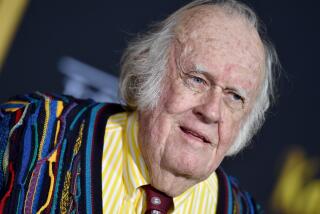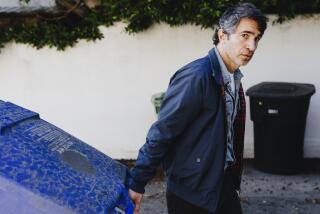Peter Falk dies at 83; actor found acclaim as ‘Columbo’
Peter Falk, the gravel-voiced actor who became an enduring television icon portraying Lt. Columbo, the rumpled raincoat-wearing Los Angeles police homicide detective who always had “just one more thing” to ask a suspect, died Thursday. He was 83.
Falk, who reportedly suffered from dementia, died at his home in Beverly Hills, according to a statement from Larry Larson, a friend and an attorney for Falk’s wife, Shera.
In a more than 50-year acting career that spanned Broadway, movies and television, Falk appeared in more than 50 feature films, including “A Woman Under the Influence,” “Husbands,” “Luv,” “Mikey and Nicky,” “The In-Laws,” “Wings of Desire,” “The Great Race,” “The Cheap Detective,” “Cookie” and “The Princess Bride.”
PHOTOS: Peter Falk’s life and career
“Husbands” (1970) and “A Woman Under the Influence” (1974), both of which were written and directed by Falk’s close friend, John Cassavetes, provided Falk with two of his best-known dramatic film credits.
But it was in his role as the blue-collar family man trying to deal with his mentally unstable wife (played by Gena Rowlands) in “A Woman Under the Influence” that he created what former Times film critic Charles Champlin called “one of the most complex and contradictory portraits in his career.”
Through a spokesman, Rowlands told The Times on Friday: “Today we lost someone who was very special and dear to my heart. Not only a wonderful actor but a very great friend.”
Early in his film career, Falk received two Academy Award nominations for best supporting actor — for playing a vicious mob assassin in “Murder, Inc.” (1960) and for his portrayal of a gangster’s right-hand man in Frank Capra’s comedy-drama “Pocketful of Miracles” (1961).
Falk’s on-screen combination of toughness and gentleness prompted Hollywood columnist Hedda Hopper to label the native New Yorker “another James Cagney or John Garfield — a man to replace irreplaceables.”
In 1962, Falk won his first of five Emmys by playing a truck driver who befriends a lonely, pregnant girl in “The Price of Tomatoes,” a segment of “The Dick Powell Show.”
A decade later, he received raves on Broadway as the frazzled New York advertising account executive in Neil Simon’s hit comedy “The Prisoner of Second Avenue.”
But nothing Falk did came close to matching the acclaim and popularity he found playing the title role in “Columbo,” the crime-drama for which he won four of his Emmys.
Launched with two TV-movies starring Falk — “Prescription: Murder” in 1968 and “Ransom for a Dead Man” in 1971 — “Columbo” began in the fall of 1971 as one of three 90-minute shows on the “NBC Sunday Mystery Movie,” alternating with “McMillan and Wife,” starring Rock Hudson and Susan Saint James, and “McCloud,” starring Dennis Weaver.
“Columbo,” however, became the stand-out show. “There isn’t a detective on television who can touch him, either in style or ratings,” one critic wrote of Falk.
The format of the series, created by Richard Levinson and William Link, inverted the classic detective formula: The TV audience already knew whodunit when Columbo arrived on the scene of the crime. The enjoyment for viewers was in seeing how Columbo doggedly pieced the clues together. As he said in one episode, “I have this bug about tying up loose ends.”
Columbo, who was never given a first name, became one of the most memorable TV characters in television history — ranked No. 7 in TV Guide’s 1999 list of “TV’s Fifty Greatest Characters Ever.”
With his tousled dark brown hair, a cheap cigar wedged between his fingers and his lived-in tan raincoat, the endearingly likable lieutenant was as unprepossessing as the faded old Peugeot he drove.
Indeed, when Columbo brought up the subject of men’s clothing and male vanity in one early episode, guest star Suzanne Pleshette, as the segment title’s “Witness to a Murder,” pointedly looked at the disheveled detective and remarked: “Some men, Lieutenant, do not want to look like an unmade bed.”
The show often made light of Columbo’s lack of fashion sense. Taking note of the detective’s tatty attire, a suspect once asked him, “Are you undercover?” Replied Columbo, “No, underpaid.”
In another episode, a nun at a soup kitchen where Columbo was interviewing a witness took one look at his worn raincoat, mistook him as a vagrant and insisted on finding him a better coat in the shelter’s used-clothing collection.
Columbo: “Y’know, I appreciate what you’re doin’, I really do, but I’ve had this coat for seven years.”
Sister: “Oh, you poor man!”
Admonished by the nun not to feel ashamed of his shabby raincoat, Columbo said: “No, I’m very fond of it.”
But beyond his rumpled exterior, disarmingly childlike curiosity and seeming disorganization — he’d frequently lose his pencil and have to borrow a pen to jot down notes — there was no question Columbo was the right man for the job.
Head cocked, slightly hunched and his hand occasionally rubbing his furrowed forehead, he may have appeared to be absorbing nothing, but he missed nothing.
For the prime suspect, that was never more clear than when Columbo headed to the door, stopped and, in his gravelly voice, said, “Oh, there’s just one more thing …”
Falk had the best take on Columbo, a character he never tired of portraying.
“I love him,” he told TV Guide in 2000. “He’s eccentric, oblivious to the impression he makes on people. His obsessiveness is hidden by his graciousness. He has a sly sense of humor, is by nature polite and totally devoid of pretension. But God help anyone who commits murder in Los Angeles.”
In 1989, Falk returned in new “Columbo” dramas as part of the “The ABC Mystery Movie,” a new series of three rotating two-hour dramas. After that series ended in 1990, he continued to turn up periodically in “Columbo” TV movies until 2003.
In 2000, after more than three decades of playing his famous TV character, Falk acknowledged that only slight changes had been made.
“It’s tougher to bum a match; there are a few more ketchup stains on the raincoat,” he told TV Guide. “Other than that, we’re still dying to know what he’s thinking.”
Falk was born in New York City on Sept. 16, 1927, and grew up in Ossining, N.Y., where his parents owned a clothing store. (Decades later, Ossining named a street after him — Peter Falk Place — which he unveiled by pulling a Columbo-style raincoat off the street sign.)
At age 3, Falk underwent surgery to remove a malignant tumor that cost him his right eye. He later recalled dreading having anyone ask him what was the matter with his eye. But by the time he was a teenager, his self-consciousness disappeared after he realized he could get a laugh with it.
Once, when he was unfairly called out at third base during a high school baseball game, Falk is said to have taken out his glass eye and offered it to the umpire saying, “You need this more than I do.”
In high school, he was a three-letter athlete (baseball, basketball and track), a debating-team member and senior class president.
Falk, who first appeared on stage in a summer-camp musical, also played small parts in high school stage productions.
“But,” he told People magazine in 1991, “I could never tell any of the guys I was knockin’ around with I wanted to be an actor. It was too strange.”
After graduating from high school in 1945, Falk began a year-long post-war stint as a cook in the merchant marines. He attended Hamilton College in Clinton, N.Y., from 1946 to 1948, then transferred to the New School for Social Research in New York City, where he earned a bachelor’s degree in political science in 1951.
Two years later, he earned a master’s in public administration from Syracuse University and went to work as an efficiency expert for the Connecticut State Budget Bureau in Hartford.
In his spare time, he joined a community theater group in Hartford, the Mark Twain Maskers, and studied with renowned actress Eva Le Gallienne at the White Barn Theatre in Westport.
Encouraged by Le Gallienne to become a professional actor at 28, Falk quit his job and moved to New York City.
Falk, who continued to study acting in New York, first gained attention playing the bartender in the 1956 Off-Broadway revival of Eugene O’Neill’s “The Iceman Cometh,” starring Jason Robards.
He made his Broadway debut playing the English solider in “Saint Joan” in 1956 and appeared on television shows such as “Studio One” and “Naked City.”
Although Falk made a screen test for Columbia Pictures in the late ‘50s, studio boss Harry Cohn turned him down, saying, “For the same money I can get an actor with two eyes.”
But his glass eye proved to be no handicap.
In the wake of his two Oscar-nominated film performances and Emmy Award in the early ‘60s, Falk was offered — and turned down — a number of potential TV series.
But he accepted “The Trials of O’Brien,” a legal drama in which he played a talented New York attorney with a less-successful personal life. Although a critical success, the show fared poorly in the ratings and was canceled in 1966 after one season.
For Falk, who had played his share of heavies over the years, “Columbo” was a welcome change of pace.
“I’d done too many shows where I’d walk into a hospital room where a man was in bed and I’d go over and turn off the oxygen,” he told TV Guide in 1972. “I’ve shot, knifed and beat people in too many bloody scenes. There’s no fun in doing that. I like to do something optimistic, where the people try to live, not die.”
During his long run as Columbo, Falk received a lot of fan mail from police officers.
“You get cops saying, ‘I use the Columbo technique,’” he told The Times in 1990. “Or you go somewhere and a cop will come up and say, ‘We have got a Columbo on the force who we call Columbo, and on his birthday we bought him a raincoat.’ They send me pictures of cops dressed as Columbo. So they get a kick out of it.”
While it is hard to imagine anyone else playing the character, “Columbo” creators Levinson and Link originally offered the role to 67-year-old Bing Crosby, who turned it down.
As Falk often said: “Thank God he had a golf tournament.”
Falk married his first wife, Alyce, in 1960, and adopted two daughters, Catherine and Jackie. A year after the couple divorced in 1976, he married actress Shera Danese.
Catherine Falk had filed for conservatorship of her father in late 2008, contending that she had not been allowed to see him since his hip-replacement surgery earlier that year. She later withdrew a petition to take control of his finances.
In 2009, the court allowed his wife to remain in control of his personal care and affairs but ordered that his daughter be allowed to see her father for 30 minutes every other month, a mandate that remained in place at the time of his death.
Falk’s survivors include his wife and his two daughters.
PHOTOS: Peter Falk’s life and career
Los Angeles Times staff writer Valerie J. Nelson contributed to this report.
More to Read
Start your day right
Sign up for Essential California for the L.A. Times biggest news, features and recommendations in your inbox six days a week.
You may occasionally receive promotional content from the Los Angeles Times.







